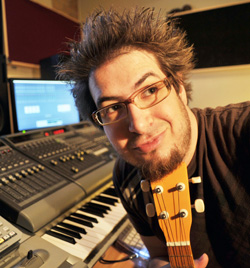
Lofty dreams for Leslieville composer
There’s a fine balance between zany and serious for self-employed composer and sound editor, Neil Parfitt.
Production equipment greets all who enter the 29-year-old’s Leslieville office, but once the eyes get accustomed to the gold-hued lighting and the flashing music gadgets, the finer details crawl out from the woodwork.
Muppets, Family Guy kith and kin and anime characters form a phalanx along the shelves of a bookcase tucked to one side.
Parfitt grins and gazes cheerfully at the toys’ direction. He says they’re his muses.
“(When) I am working on cartoon stuff — usually I have to do a bunch of serious stuff, action, mystery and then stupid, silly stuff — if I need a way to get inspired for that, all it takes is looking at various characters,” he says, with a chuckle.
Still, with Parfitt’s dream being to compose musical scores on epic films à la Danny Elfman, he has to staccato his buoyant personality.
“It’s kind of hard though because I’m trying to get into more serious film work, and animation is a large part of what I do.”
A Fanshawe College grad, Parfitt has been working hard in his industry since graduating from the London, Ont. school’s music program in 2000.
Once out of college he had media company Nelvana in his sights. But it took a little time for them to warm up to Parfitt.
“I phoned them every week for six months,” he says, his eyes large with amusement. “And then finally I sent them this huge bag of coffee with a ransom note on it.”
A week later, he got a call back. The bribe worked.
Now he’s working on two animation projects for TV: Bakugan Battle Brawlers, which is popular among the tween crowd, and Beyblade Metal Fight, due out this fall.
Unlike the old Looney Tunes cartoons that were drawn to the musical arrangements of the legendary Carl Stalling — Parfitt’s idol — modern composers write to animation.
The transition poses different challenges, Parfitt says.
“You can cover movement and action because you can visualize what’s happening,” he says. “That’s a huge help when working on animation because you’ve got to capture all those quick little moments, shifts and turns.”
Always working under tight deadlines, Parfitt sends off his compositions to directors for approval, which take a day at most.
“It’s really fast,” he says. “It’s not like a movie where you have a month to work on stuff.
“You’ve got days to figure it out.”
If the score is given the thumbs down he has to revisit it. And the process can keep him at the keyboard for 12 to 15 hours a day, he says.
“Sometimes I’m here all the time and then I’ll have a month off, where I don’t have to be here at all,” he says of his small office housed inside an old warehouse near Queen and Coxwell.
As for the extra hours, Parfitt doesn’t mind.
“The fact that when I go to work I can sort of play,” he says about the pluses of his job. “I’ve always loved this stuff, so even when it’s super stressful, I’m playing.
“It’s a joy in creating music that didn’t exist before.”
